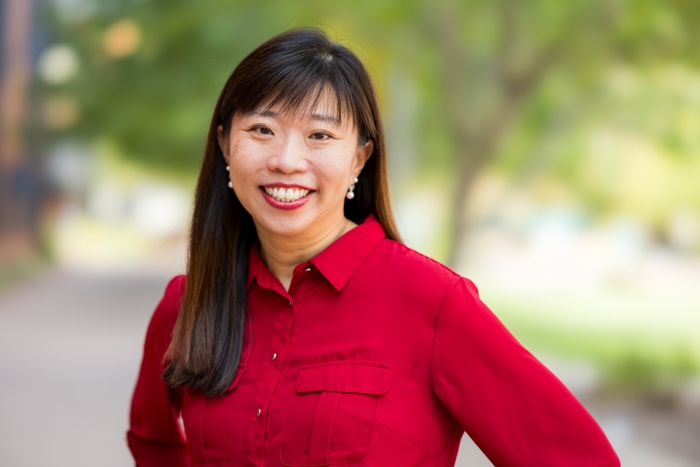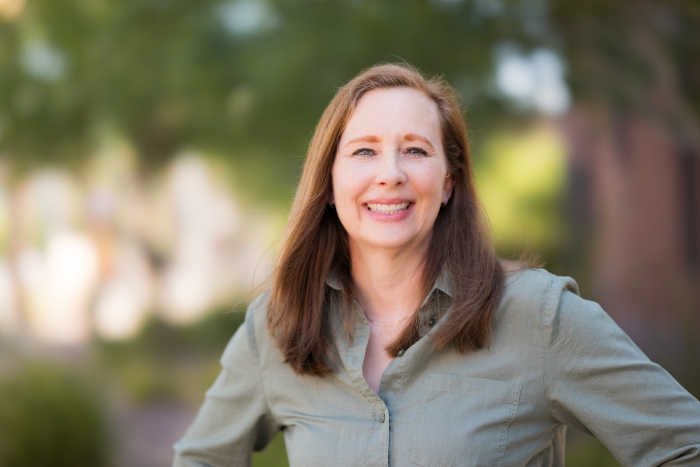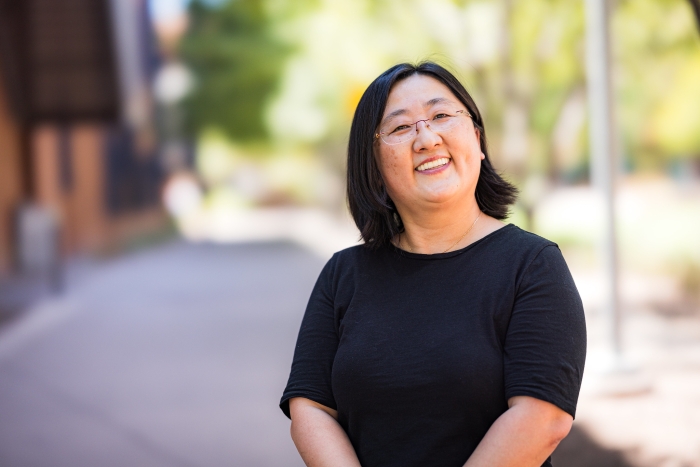3 ASU faculty named 2024 President's Professors
From left: ASU Executive Vice President and University Provost Nancy Gonzales; new President's Professors Pamela A. Marshall, Pauline Cheong and Teresa Wu; and ASU President Michael M. Crow pose for a photo during the induction ceremony Tuesday in Old Main on the Tempe campus. Photo by Tim Trumble
Three Arizona State University faculty members have been named President’s Professor, a designation that is one of the university’s top faculty honors.
Pauline Cheong of the Hugh Downs School of Human Communication, Pamela A. Marshall of the School of Mathematical and Natural Sciences, and Teresa Wu of the School of Computing and Augmented Intelligence were inducted Tuesday.
The honor — which has been bestowed annually since 2006 — recognizes professors’ innovation in teaching, ability to inspired original and creative work by students, and master of subject matter and scholarly contributions.
“Modern learners have access to unprecedented, sophisticated technologies, ideas and creative tools, but inspiration, motivation and guidance are equally important,” said ASU President Michael M. Crow. “Our President’s Professors represent the exemplary scholarship, teaching and research that lights a fire in future thinkers and advances our collective knowledge in important and enduring ways.”
The three professors were honored at a ceremony Tuesday in Old Main on the Tempe campus.
“It was a joy to recognize and celebrate the newest cohort of President’s Professors,” said ASU Executive Vice President and University Provost Nancy Gonzales. “President’s Professors embody the highest qualities of faculty excellence. They are notable scholars that create new knowledge and advance a deeper understanding of our world.
“And they are master teachers who are beloved by the students that they nurture and mold into the future leaders, scholars and experts that they become. Professors Cheong, Marshall and Wu are rare examples of faculty members who excel in every aspect of their profession. On behalf of the entire ASU community, it is my honor to recognize their accomplishments and impact with this honor.”
Learn more about the professors and their work below.
Principled Innovation in communication and AI research
Pauline Cheong is a distinguished professor at the Hugh Downs School of Human Communication who also serves as a senior global futures scientist and holds multiple positions as a President’s Professor at the Institute for Social Science Research; the Center on Technology, Data and Society; the Graduate Faculty; and the Center for the Study of Religion and Conflict. Additionally, she is an affiliated faculty member at the Center for Asian Research.
Cheong's research delves into the sociocultural implications of communication technologies, including digital and social media and, more recently, generative AI. Her work on principled innovation has led to numerous funded projects worldwide, focusing on AI and embodiment, AI in governance and AI in local and global religious leadership.
Teaching at ASU has been a fulfilling experience for Cheong.
“I am thankful that I get to teach at ASU, to enlighten and ennoble, and move us collectively toward our charter goals," says Cheong, whose innovative teaching methods seek to inspire and connect with students, addressing the challenges of a digital age where students often feel disconnected and overwhelmed by information.
Cheong has also been a key figure in mentoring students and guiding them through research projects. Her mentorship extends beyond her unit, as she has served as a faculty mentor for the President Barack Obama Scholars program and the Undergraduate Research Fellows Program at the Center for the Study of Religion and Conflict. Her efforts have been recognized by Crow, who praised her “forward-thinking approach” and “extraordinary contribution.”
“Professor Cheong consistently inspires her students to engage beyond the classroom, encouraging them to internalize these lessons in their professional lives,” says Sarah J. Tracy, director of the Hugh Downs School. “Her innovative teaching methods, such as using avatars and AI systems, help students navigate the internet ethically and critically.”
Looking to the future, Cheong hopes that the critical thinking and writing skills she fosters in her students will lead to a greater awareness of AI communication, ultimately strengthening community and global engagement.
A passion for science, dedication to students
Pamela A. Marshall is a full professor in the School of Mathematical and Natural Sciences on the West Valley campus, where she teaches courses in genetics and pharmacology and uses yeast genetics to study basic cellular biology and applied analysis for rational drug design.
She is a senior member of the National Academy of Inventors, for her intellectual property work in rexinoid synthesis and biology with Peter Jurutka and Carl Wagner, with whom she shares multiple patents.
Marshall’s academic accomplishments are exceeded only by her career-long dedication to student success.
“She is a top-notch scientist focusing on translation, consistent with the ASU Charter, with more than 10 U.S. patents and similar outcomes to show for her commitment,” says Lara Ferry, also a President's Professor and interim vice president of research in ASU’s Knowledge Enterprise, who has worked with Marshall for more than 14 years.
“That work is only exceeded by her absolute passion for, and joy in, the success of her students. I know of no other educator so committed to bringing the very latest science into the classroom, using creative tools to facilitate learning, and making sure that learning experiences are connected to tangible outcomes related to the students’ personal goals.”
While Marshall’s collaborations work to address conditions including Alzheimer’s, autism and cancer, she counts among her greatest accomplishments the hundreds of students who have pursued medical school, graduate training and other scientific careers through her mentorship.
Her student focus is exemplified by the sign on her office door: “Some people only dream of meeting their favorite scientists. I teach mine.”
Creating connections and inspiring globally minded graduates
“The engineering field operates on a global scale, tackling complex problems that transcend national boundaries,” says Teresa Wu.
Wu is a noted trailblazer in medical technology powered by artificial intelligence, or AI, serving as the founding co-director of the ASU-Mayo Center for Innovative Imaging. In that role, she leads a research team finding ways to apply AI to PET scans to develop better screening systems for Alzheimer’s and other neurodegenerative diseases.
But Wu is also a professor of industrial engineering in the School of Computing and Augmented Intelligence, part of the Ira A. Fulton Schools of Engineering at ASU, who is passionate about fostering global connections and preparing students to solve the world’s most pressing engineering challenges.
She collaborates closely with the ASU Global Education Office to advance student engineering education programs all over the world. Wu works to expand access to study abroad opportunities, build partnerships with industry, academic and governmental agency partners and ensure student success by developing rigorous, flexible curriculums created with global challenges in mind.
In February, Wu was named the Fulton Schools associate dean of global engagement and tasked with defining worldwide educational priorities. Recently, she has sought to create new opportunities through The Engineering Design Institute in London, or TEDI. Programs in development seek to encourage TEDI students to pursue engineering graduate degrees at ASU, help faculty members lead study abroad programs in London, and align TEDI and Fulton Schools curriculums.
Now, Wu’s efforts to inspire students beyond borders and language barriers have been recognized by her induction as a President’s Professor.
“I’m thrilled to receive this award from President Crow. As educators, we all strive to be the foundation of student success,” Wu says. “The vision of the New American University is about building a launchpad for master learners who want to make a meaningful societal impact."
Ross Maciejewski, director of the School of Computing and Augmented Intelligence, believes the induction is well deserved.
“Teresa Wu is a global recognized innovator in medical imaging and is on the front lines of the development of new artificial intelligence in the health care sector,” he says. “But the President’s Professor award recognizes excellence in teaching. As school director, I am especially proud that Teresa continues to inspire students even as she remains focused on her own impactful research.”
Kelly DeVos, Richard Holland and Charles Najera contributed to this story.
More University news
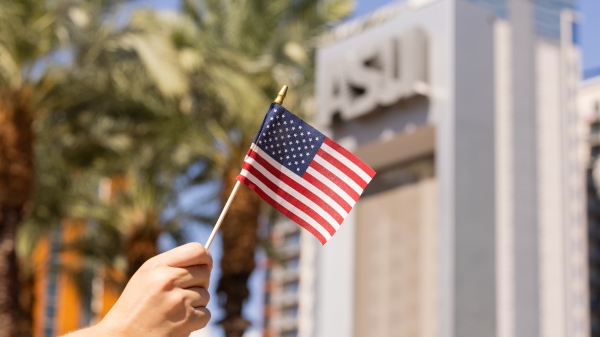
ASU establishes Center for Free Speech, will host annual free speech forum
Arizona State University is establishing a new Center for Free Speech to encourage the uninhibited exchange of ideas, and the university will launch an annual free speech forum that will begin in…

Public affairs professor, back at ASU after 3 years with NSF, is named Sackton Chair
After three years at the National Science Foundation, Professor Mary Feeney has returned to Arizona State University, where she intends to help early-career women and women of color succeed in…
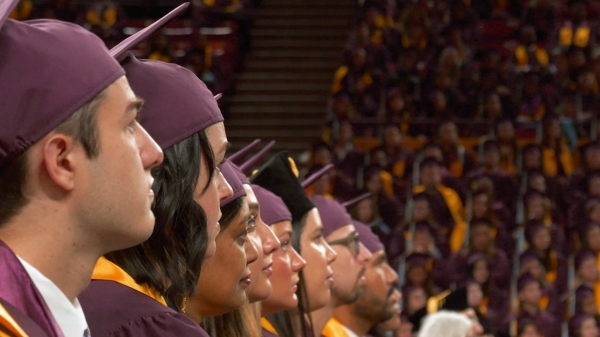
A decade strong: ASU takes top spot in innovation for 10th year in a row
For the 10th year in a row, Arizona State University is No. 1 in innovation in the newly released annual “Best Colleges” 2025 rankings by U.S. News & World Report — just one of many top rankings…
